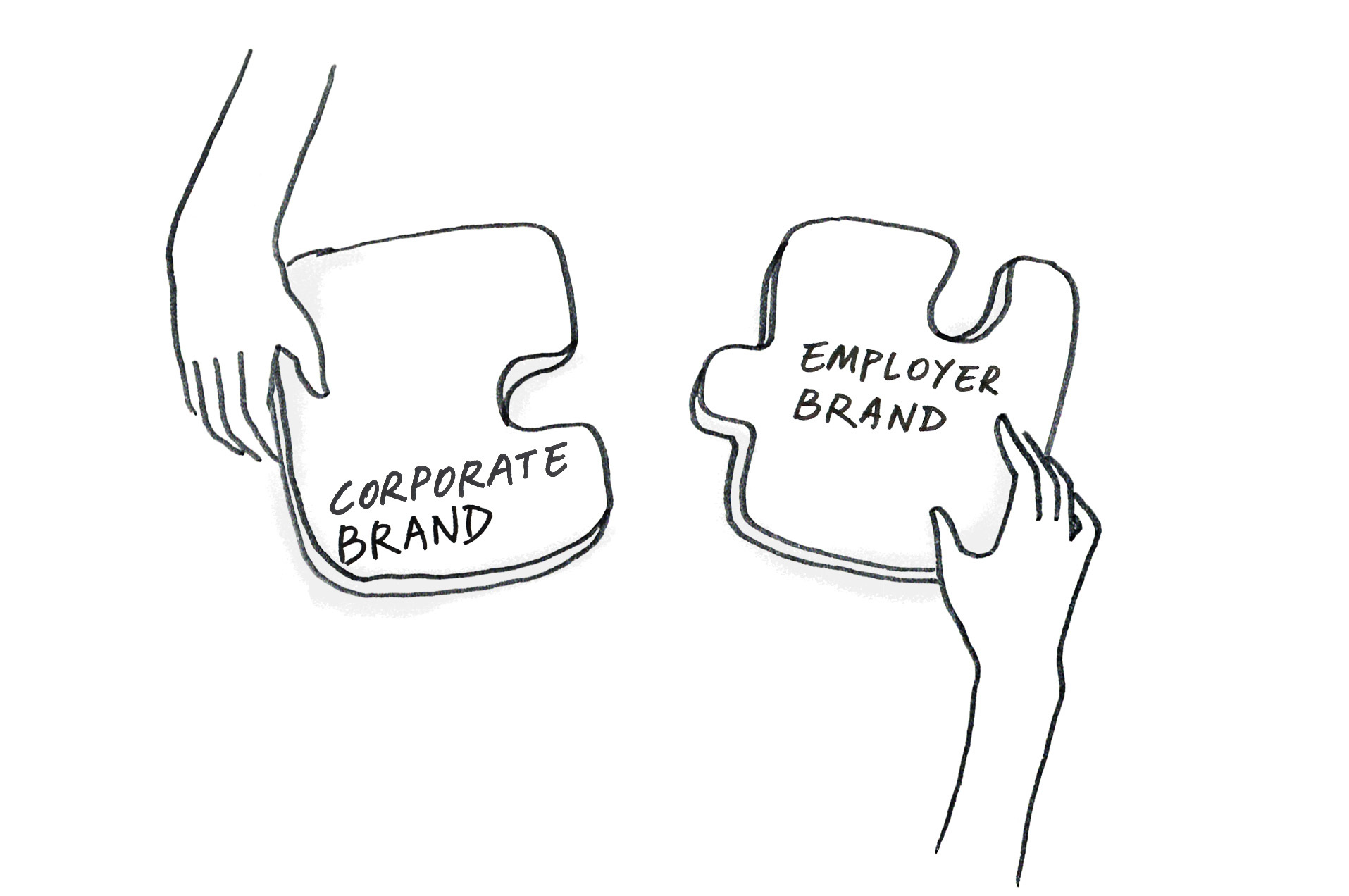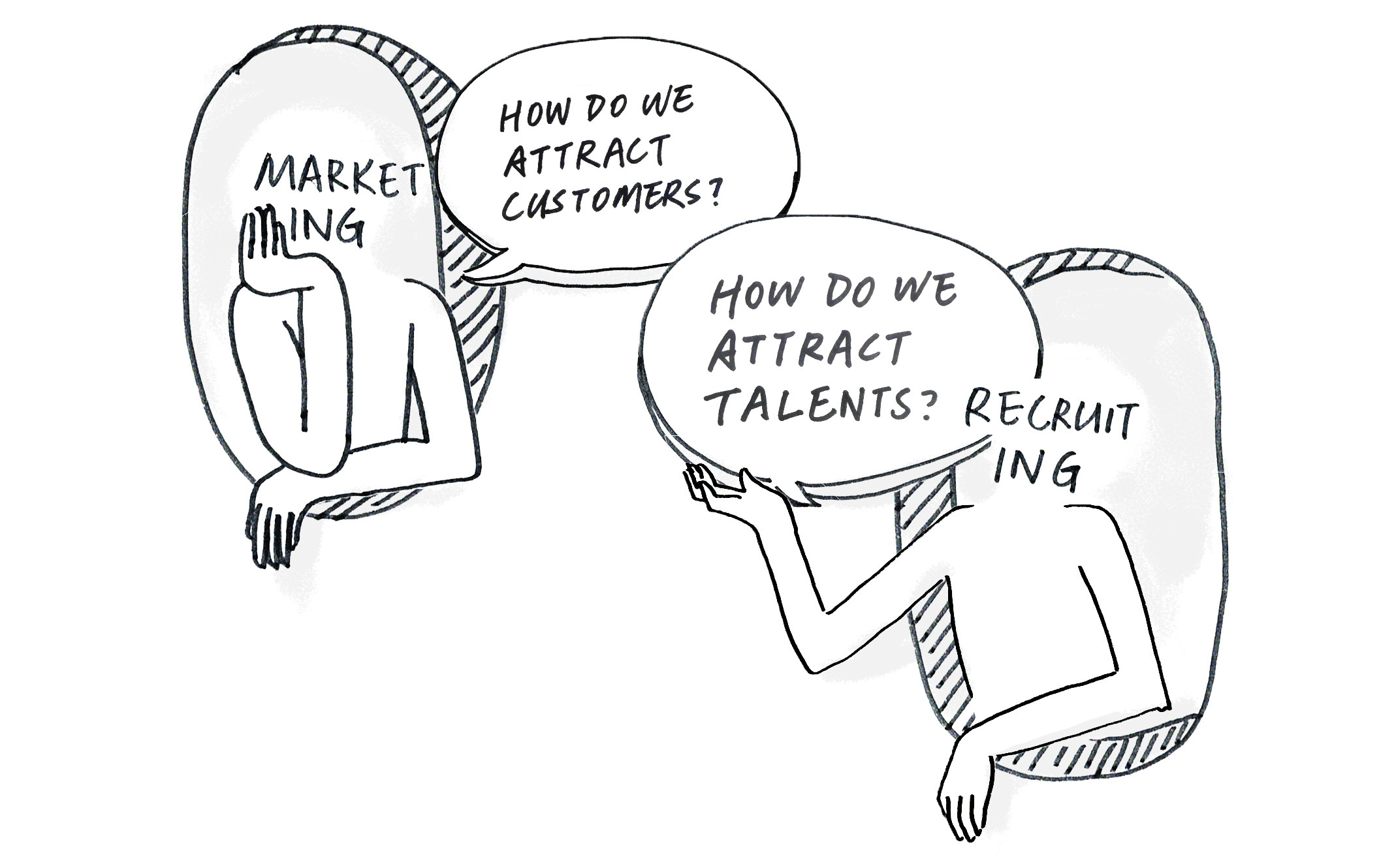
What, in your opinion, is the difference between a corporate brand (hereafter: brand) and the employer brand?
Fundamentally, corporate brand and employer brand are one unit. They are expressions of a shared DNA throughout the company. You can also think of the brand as a person. Their personality always stays the same, but they adapt their behavior to different situations. Just as we interact differently with family, friends, or clients, but still remain ourselves. The employer brand addresses employees and potential employees, and communicates content relevant to these target groups. But always in a way that matches the company’s personality.
"You can think of the brand as a person. The personality stays the same, but the behavior adapts to different situations."
Why, in your opinion, should HR engage more strongly with branding?
For a long time, HR departments had their pick of the best candidates. But for some time now, we’ve been in an employee-driven market, where qualified professionals can choose their employer. This raises the question for companies: how can they influence those choices? A strong brand helps stand out among potential employers. It’s important to show the authentic personality of the company. But that’s something many companies struggle with in practice.
What difficulties do you see here?
Strategic brand positioning requires methodological know-how. All too often, companies mistake general standards or wishful thinking for a differentiating position. The infamous fruit basket is a good example of a standard: it doesn’t lead to distinctive visibility or attractiveness in the market, because so many companies advertise it. Wishful thinking doesn’t help either: if a company presents itself as young and hip but is actually conservative, professionals won’t stick around long. They’ll quickly be disappointed by the reality.
For strategic brand positioning, the brand DNA must be identified. There are models and methods for this. With the employer brand developed from it, HR can approach new talent more effectively and efficiently and create a strong environment for the existing workforce.
"If a company presents itself as young and hip but is actually conservative, professionals won’t stick around long."
To what extent must brand and employer brand be consistent?
A well-developed brand is authentic and describes the company’s personality. A good employer brand is therefore consistent with the corporate brand and only adds the employer perspective. This includes, for example, the working atmosphere or the employees’ self-image within the company.
If the employer brand is not consistent with the corporate brand, conflicting messages may be communicated. This erodes trust among customers, employees, and talent — and ultimately weakens the brand.
What risks arise from that?
It can go so far that the company’s entire business is put at risk. To avoid that, it’s important to involve brand stakeholders in the employer branding process early on. This way, brand messaging stays consistent across the organization and generates added value. It’s important to understand that a brand is an image formed in people’s minds. Brand management aims to ensure that this image is as consistent and distinctive as possible.
"A brand is an image formed in people’s minds — and this image should be as consistent and distinctive as possible."
Why is this relevant for HR?
Companies want employees who identify with the brand and are proud to work there. They should feel a sense of community under the brand’s umbrella. Employees also carry the brand outward and act as important brand ambassadors. And they do this anyway — a poor company culture or an employer brand that doesn’t align with the brand image will only lead to confusion. A strong employer brand increases attractiveness in the job market. Talents are drawn to it and can be recruited more easily.

In what ways do you see parallels between marketing and HR?
In marketing, everyone understands that customers choose from a wide array of products, so they must be convinced of the brand’s value. That wasn’t always the case — customer power has increased since the Industrial Revolution, and in a digital, globalized economy, options are almost unlimited. HR is now undergoing the same paradigm shift, in part due to demographic changes.
Classic marketing questions are now being asked in HR: Which people are we addressing, on which channel, with which messages? Topics like personas and user journeys are gaining relevance. Many KPIs are also comparable: marketing looks at customer satisfaction, HR looks at employee satisfaction. And both want to reach high numbers to minimize turnover costs.
It’s also important to note: brand and marketing are not the same. That’s one of the biggest misunderstandings. The brand is the lived identity of a company — it shows the personality from the inside out. Marketing, on the other hand, is the alignment of the company with customer needs — a view from the outside in. Of course, brand and marketing must work together, but they are not identical.
"The brand is the lived identity of a company: it shows the personality from the inside out."
What other areas do you see parallels with?
It’s also interesting to look at the parallels between sales and recruiting. In the search for professionals, recruiting adopts tried-and-tested methods and processes from sales. The personalities in recruiting also differ from classic HR profiles and tend to be more sales-oriented. Just as the brand is a critical foundation for strong sales, a strong employer brand is the foundation for successfully recruiting talent.
"There are clear parallels between sales and recruiting: tried-and-tested methods and processes from sales are adopted in recruiting."
What initial steps do you recommend for companies looking to build or revise their employer brand?
The first question to ask: What is our corporate brand? Is it well-developed — character-defining, relevant, and differentiating? That’s important because the employer brand is derived from it. If the company brand is not yet clearly defined, that’s a good opportunity to work on it in tandem with the employer brand. The next step is to build a joint task force from HR and brand/marketing. This ensures all necessary competencies come together. Management should be involved at least as a sponsor, to give the initiative the necessary clout.
What does implementation look like in concrete terms?
A good starting point is to conduct a survey among employees and applicants. Even better are qualitative interviews, as they tend to reveal more than large-scale surveys with standardized responses. This helps uncover what makes the company special for employees. What values are lived? What commonalities and differences exist? How is the company perceived by applicants? After that, the company’s DNA should be described from the employer perspective. The results should not differ fundamentally from the corporate brand but should complement it. If that’s achieved, the foundation for successful employer branding is laid.
From your experience, what are typical mistakes in building an employer brand, and how can they be avoided?
A typical mistake is developing the employer brand in isolation from the corporate brand. Often, this is due to a lack of understanding about what a brand actually is. Companies should train their HR staff on branding. This topic is becoming increasingly important for HR work.
How can companies authentically convey their values and culture through the employer brand?
First comes the hard part: the company must know its own DNA. You have to let go of idealized images and embrace real life with all its imperfect facets. The upside? That’s usually highly differentiating, because every company is different. Employees at all levels can be used as brand ambassadors — and they should be allowed to speak honestly about the company. Let’s be real, they do that anyway — every time they talk to friends or acquaintances about their job.
"The company must know its own DNA. Let go of idealized images and embrace real life with all its imperfect facets."
Can an employer brand be designed to appeal across generations — from Gen Z to Baby Boomers? If so, how?
Yes, absolutely. First, we should ditch the habit of thinking in age brackets like Gen Z. A classic issue in target group strategy is the “sociographic twin”: King Charles and Ozzy Osbourne are in the same age group, just days apart — but no one would seriously suggest they think alike. It’s better to define target groups based on values, attitudes, and lifestyles. The Sinus Milieus model, for example, groups people accordingly. You may find Gen Z and Boomers in the same segment because they both tend to be conservative and traditional. Also, studies show that the differences between generations are often exaggerated or misattributed. Surprise: Gen Y cares more about remote work than Gen Z — makes sense, they’re raising kids right now.
How can you actually measure whether employer branding is working?
An important question, especially with tight budgets. The foundation is a clear goal: What do we want employer branding to achieve? Once that’s defined, measurable outcomes can be derived — like employee satisfaction, turnover, recruitment effort, or number of quality applications. But beware: the many metrics available also open the door to misinterpretation. Many factors outside employer branding can influence the numbers. And not all companies have the budget to conduct effectiveness studies.
If you could give HR professionals one single piece of advice on employer branding, what would it be?
Think beyond the obvious. Ask yourself what makes your company unique — and have the courage to be authentic.

How do you see the future of employer branding, and what role will HR play?
I think we’ll see two key developments: one, employer branding will become increasingly integrated with brand and marketing departments. Two, some HR roles will evolve to bridge the gap between brand, marketing, and HR.
About ruby
ruby. is a Zurich-based agency that advises companies on strategic brand positioning, develops unique brands, and implements appropriate measures.
About Gunter Dobratz
Gunter Dobratz is a Partner & Senior Consultant at ruby.
He understands the DNA of companies and helps create attractive employer positioning as part of an authentic brand. He holds a Master’s in Business Environmental Informatics and two CAS degrees in Brand Management and Culture & Employer Branding. As a consultant on equal footing across age groups and hierarchies, he works with national and international clients.

